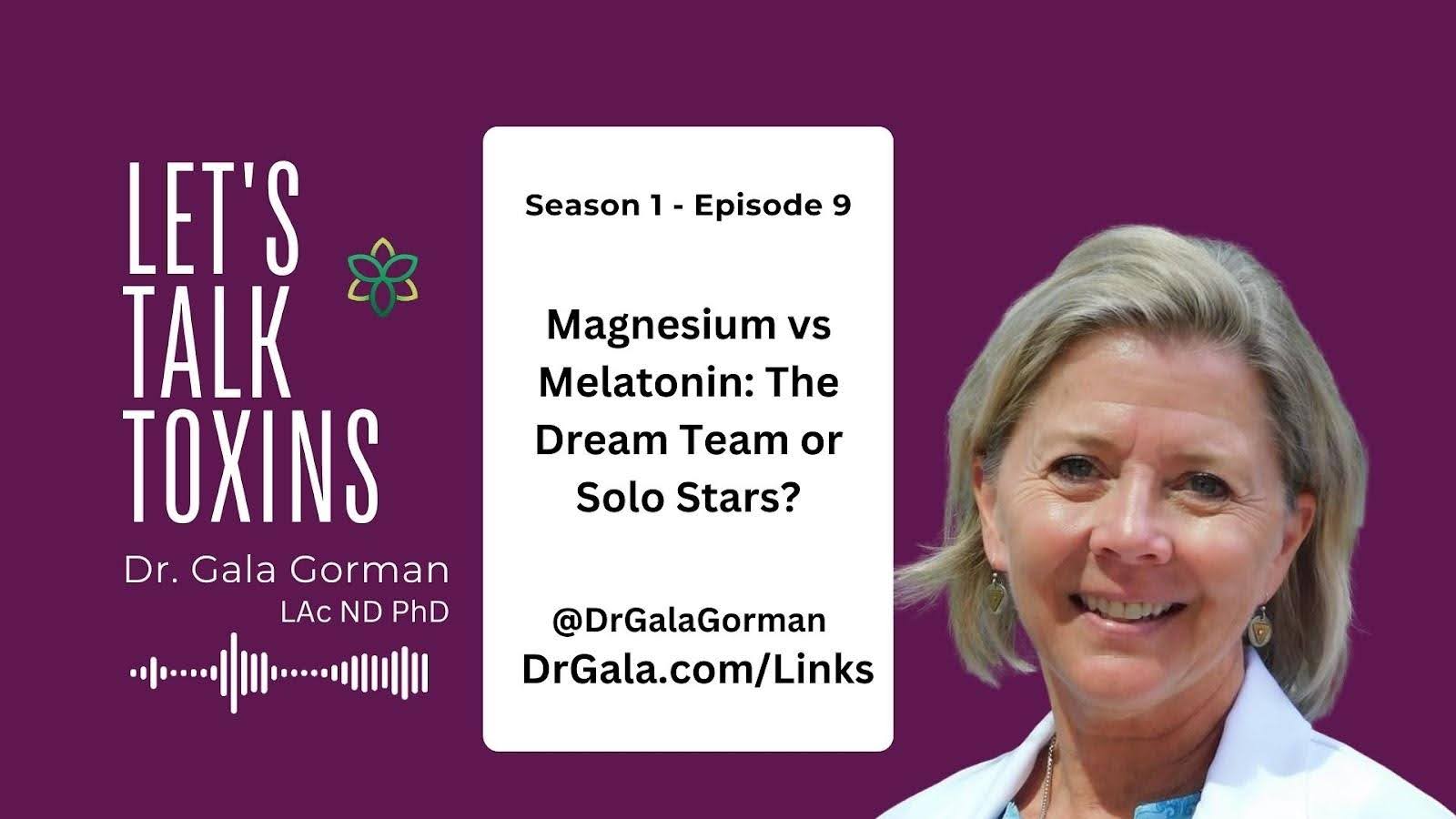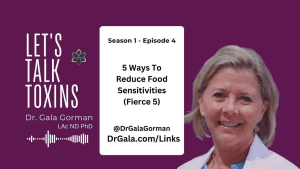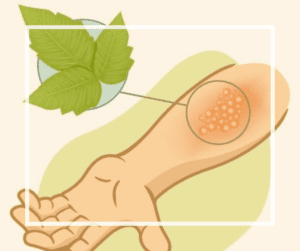NOTE: A machine generated this transcript. Please be aware that it may contain occasional errors in punctuation and spelling.
Magnesium really helps with muscle cramping. So if you’re having nocturnal leg cramps or cramping at night, just know that you’re not alone. It affects about 37% of Americans over 60. Melatonin, on the other hand, is a hormone produced by the brain that regulates the sleep-wake cycle. So, magnesium might offer some long-term benefits for sleep quality, but melatonin has a more immediate impact on falling asleep.
Welcome to the Let’s Talk Toxin show. You may have heard that you should supplement with magnesium or melatonin or both for many reasons, not limited to improving sleep. In this episode, we’re comparing and contrasting. It’s magnesium versus melatonin. If you have trouble falling asleep or staying asleep through the night and feel tired and sluggish the next day, these could be signs that your body needs a bit of support to improve your sleep.
Our magnesium and melatonin, a dream team? Let’s find out! And if you’re new here, I’m Dr. Gala Gorman, a licensed acupuncturist, naturopath, and author of “What’s Your Kryptonite?”. I wrote the book to help women understand the effects of chronic stress that’s turned toxic. In the book, I share the MOLT Method™ I developed. To make it easy to shed stress, along with the accumulated toxicity. Just like any other creature in nature that’s outgrown its trappings. So that you can cruise through midlife and beyond symptom-free. So that you can put an end to health issues like chronic fatigue, insomnia, mood swings, and even weight gain.
MOLT, in this case, is an acronym. The T stands for toxins. And I can say with confidence that every symptom is caused by accumulated toxicity. I evaluate 12 categories of toxicity when I’m working with someone to unravel a health mystery. Our world is full of manmade substances that our bodies were not designed to deal with. Coupled this toxicity with an overwhelming amount of toxic stressors, the body was designed to manage, and it’s no wonder women find themselves playing whack-a-mole with symptoms.
In this segment, I share information from research studies related to toxicity. You can think of it as a Toxin Trend. In this report, it’s a great example of a toxin trend. It’s related to a fascinating study published in Environmental Science and Tech in late 2023. It’s talking about how indoor plants might not be the air-purifying superheroes we thought they were when it comes to chemical toxicity in our homes.
You know I’m always talking about reducing our toxic load and many of us, myself included, have really tried to bring live plants into our homes. Thinking that they’re helping to clean our air of harmful volatile organic compounds known as VOCs. But the research team at Drexel University found that while plants can remove some VOCs from the air, they do it much more slowly than we previously believed.
So to make a meaningful difference in air quality, you need an unrealistic number of plants. And honestly, I can barely keep the few alive that I already am struggling with. And we’re talking about a small jungle of plants in every room to really make a difference. But don’t give up on your plant babies just yet, because they do still offer some amazing benefits for our emotional wellbeing. And that is crucial for managing chronic stress and supporting our body’s natural detox pathways.
So it could really just be helpful to think of indoor plants as just something that’s adding beauty to your environment. And then, rather than counting on those indoor plants to get the heavy lifting done, to remove chemical compounds from the air, you need to get a really high quality air purifier.
If you’re curious about what I would recommend for that, just drop a comment below and I’ll get back to you with some of my suggestions. But if you want some suggestions just for how to improve your indoor air quality, open the windows for 15 or 20 minutes every day if you can. This can be really effective to reduce the indoor chemical toxins.
And really it’s something that I recommend to everybody as part of their morning routine. If you are fortunate enough to live somewhere where it’s easy to open up your windows and circulate the fresh air, it’s gonna really go a long way to not just improving the air quality but to improve your overall wellbeing and just reduce stress. Plants do help to reduce stress and anxiety levels, as I was talking about before.
It really just helps to add beauty to your environment, and this supports our body’s natural detoxification process. So, they’re still valuable allies if you’re really looking for help on your wellness journey. The most effective way to reduce chemical toxicity in your home is through prevention, which involves choosing non-toxic cleaning products, avoiding synthetic fragrances, any of those plug-in devices to add fragrance to the air. Those are really not doing you any favors. You can turn to a high-quality air purifier with carbon and HIPAA filters.
And again, just comment below if you’d like me to share some of my favorite nontoxic alternatives for common household products or what kind of air purifier that I would suggest you purchase. Again, you’re gonna want to purchase a high-quality unit that really is going to make a difference. So remember, every step toward reducing your toxic load is a step toward vibrant health.
In chapter 12 of my book, “What’s Your Kryptonite?” I dedicated it to helping readers manage what I refer to as Tricky Toxins. Our bodies are bombarded with toxicity, so we have to learn to manage it. Just comment, “tricky toxins” and we’ll send you a link where you can download the chapter for free. If commenting isn’t convenient, go to DrGala.com/Links and sign up for my Wellness Weekly newsletter. You can respond to any email you received from me with “tricky toxins”, and we’ll send you a link.
Every suggestion you’ll hear from me has been tested in the trenches, and that includes saying no to symptom suppression. Over the past four decades, I’ve developed processes that work sustainably. Typically, it requires a combination of approaches that I’ve synthesize to address the health issues that show up repeatedly for many women.
In this segment, I’m opening the kimono to share how I was challenged to apply my suggestions. I’m Walking My Talk, and here’s an example. Recently, in the last couple of weeks, stress was causing me to wake up early, and sometimes I was waking up too early, meaning two to three o’clock in the morning. And this was a clear sign that my internal organs and sleeps systems, my organs of detoxification, liver in particular, were just under too much stress.
You may have heard me remind you before that when you’re waking up between one and three, this is a sign that your liver is under stress and your body is not able to do the detoxification that it’s really trying to do in those overnight hours. And when that’s the case, sometimes we can’t really control what’s causing us stress, but we do need to look for places where we’re adding stress, where we do have control over it.
So one of the ways that I know brings more stress into my world and my body, when I’m not adhering to my early time-restricted eating approach, meaning that I’m eating later, six, seven o’clock in the evening. I would never be found eating at nine or 10 o’clock at night, but even just when it starts creeping beyond 3:00 PM, that can create a problem if I’m also under a lot of additional stress. So, I really learned that ETR or early time-restricted eating is one of the things that I can do to reduce the stress and free up some resources for my body to help it handle stress better.
So, beyond the early time-restricted eating another thing that’s really critical to keep in mind is that our body really is only needing to sleep between 11:00 PM and 5:00 AM. So if you’re finding that you’re waking up a little later and it’s 5:00 AM or later, just go ahead and get up and support your body and resetting it circadian rhythms.
And that will accumulate benefits over time. Even if you feel a little tired in the first few days, you’ll find that resetting those circadian rhythms will really help you re-establish healthy biorhythms and patterns that will just overall improve your wellbeing.
Now, let’s talk about magnesium versus melatonin. And when I’m done, drop a comment and let me know if you’ve struggled with sleep issues and what’s helped you improve your sleep quality. So, magnesium is an essential mineral that helps regulate neuro-transmitters and promotes relaxation. Melatonin, on the other hand, is a hormone produced by the brain that regulates the sleep-wake cycle. So magnesium might offer some long-term benefits for sleep quality, but melatonin has a more immediate impact on falling asleep.
We’re gonna talk more about this as we progress here. So don’t think you’ve got what you need, and you can tune out. The next thing to really keep in mind is that magnesium really helps with muscle cramping. So, if you’re having nocturnal leg cramps or cramping at night, just know that you’re not alone. It affects about 37% of Americans over 60. Leg cramps can significantly disrupt sleep quality, and if your sleep is disrupted, so is your quality of life. So some of the causes might include dehydration and electrolyte imbalance, which supplementing with minerals can help, or some sort of peripheral neurological disorder.
Here’s an interesting research study that discusses magnesium, melatonin and B vitamins. And they were, in particular, studying insomnia. So this was published in the NCBI, and they were looking at the effects of combining magnesium, melatonin, and vitamin B complex to treat insomnia.
The research found that after three months of supplementation, the treatment group showed a significant improvement in insomnia symptoms. The mean Athens insomnia scale, the AIS score decreased from 14.93 to 10.5 in the treatment group, indicating a shift from moderate to mild insomnia. The combination supplement was effective in treating insomnia regardless of its cause. Both magnesium and melatonin were found to play important roles in sleep regulation and circadian rhythm maintenance. I talked to you a lot about managing your circadian rhythms. So it’s really important to kind of consider these potentially in tandem.
The research is from PubMed and the original study was titled Melatonin – Vitamin B Complex Supplementation In Treatment of Insomnia. It was published in 2019, so about five years ago, not really too long. But just know that they were specifically looking at using magnesium, melatonin, and B vitamins together.
Magnesium promotes relaxation and sleep quality by regulating neurotransmitters, that’s something I mentioned a moment ago. And melatonin production shows improvement in sleep efficiency, essentially, and increasing sleep duration for some. Melatonin directly regulates the sleep-wake cycle ,and it helps people fall asleep faster and adjust to circadian rhythm disruptions, things like jet lag or shift work.
B vitamins, this is the new little twist that they added in here. B vitamins, particularly B six and 12 may support sleep by helping with the production of the sleep-regulating hormones and also helping with nerve issues. So we talked about some of the neurological implications with the muscle cramps and so the B vitamins can really help with that. So this combination of supplementing with magnesium melatonin and B vitamins showed really promising results to improve insomnia symptoms. And at least this one study.
So, if you’re really struggling with insomnia, the most important thing is to determine whether your main issue is falling asleep or staying asleep. So you should be falling asleep typically in 15 or 20 minutes of when you’re going to bed. Now, this assumes that you’re not stimulating your brain with devices and that your sleep environment is conducive to relaxation and falling asleep naturally, but that is a topic for another video.
But if you find that you’re having trouble falling asleep andyou’ve done all the things you’re supposed to do. Then your melatonin production is not happening like it should. If you’re having more difficulty staying asleep and you’re not really waking up regularly between that 1:00 and 3:00 AM period, which points to the liver.
Then you may be finding that you’re having muscle cramps, or something like that is disturbing your sleep. This points more to magnesium. I will say that if I wake up and have any sort of leg cramp, I know I’ve got a magnesium deficiency, and I will use a particular type of magnesium that really absorbs quickly, and I can fall back to sleep fairly quickly, and the leg cramps are relieved.
So, I have a couple of things I still wanna share with you so that you can use magnesium and melatonin to optimize wellness. But remember, you can get the Tricky Toxins chapter of my book “What’s Your Kryptonite?” for free. Just comment, “tricky toxins,” and we’ll send you a link where you can download the chapter. If commenting isn’t convenient, go to DrGala.com/Links and sign up for my Wellness Weekly newsletter. You can respond to any email you received from me with“tricky toxins,” and we’ll send you a link.
Now, let’s continue with a couple of additional things I want you to know about using magnesium or melatonin. And don’t forget, when I’m done drop a comment and let me know if you found ways to improve your sleep and how you did it. So one of the things we really still need to think about here is whether we need to supplement with minerals or whether we’ve got a hormonal imbalance. So remember what I told you is, if you’re having trouble falling asleep, it could point to a hormonal imbalance.
If you’re having a problem staying asleep, it could point to a mineral deficiency. So magnesium is an essential mineral and it promotes relaxation and sleep by regulating neuro-transmitters and activating the parasympathetic nervous system. This actually supports melatonin production and really helps to regulate hormones. So, really activating your parasympathetic nervous system is something that we want to be doing regularly, and we do that through different types of relaxation exercises. This may offer long-term benefits to enhance sleep quality and help with conditions like insomnia or restless leg.
Melatonin is a hormone. And again, it’s produced by the brain. So, if you are struggling and believe that you need to supplement with melatonin, you really wanna make sure that you know what you’re doing because if you’ve got some sort of deficiency going on, I’d rather have you really get to the bottom of why your brain is not producing melatonin the way it should.
Just know that melatonin directly regulates the sleep-wake cycle. So it’s supposed to rise in the evening and signal to our bodies that it’s time for sleep, and it can be taken as a supplement to fall asleep faster and improve sleep quality. But really I’d rather have you only use it to really help adjust your internal clock. If you’re dealing with something like jet lag or shift work. You really don’t wanna be turning to melatonin and jacking with your hormones long-term. You need to get to the bottom of why your body is not producing these hormones the way it’s supposed to naturally.
So, both melatonin and magnesium can be used as sleep aids, but they work differently. Magnesium has a broader impact on relaxation and overall body functions. And melatonin acts more directly on the sleep-wake cycle. Magnesium supports melatonin production, highlighting the inner connectedness of minerals and hormones in sleep regulation.
To make this point, there was a research study that looked at magnesium and melatonin for PCOS, polycystic ovary syndrome. And this was a randomized, double-blind placebo-controlled trial that examined the effects of magnesium and melatonin supplementation for women with PCOS. The study involved 84 PCOS patients aged 18 to 40 over an eight-week period. And when they supplemented with magnesium and melatonin, they showed the most significant benefits.
Those included reduced serum, insulin levels, and insulin resistance, which really promotes metabolic health. Decreased total cholesterol and increased the HDL cholesterol. So the good cholesterol was increased, and the bad cholesterol was decreased. Lower testosterone levels so as long as these levels are still maintained in a healthy range, women with PCOS tend to have elevated testosterone levels, which creates all sorts of other issues.
So this melatonin, magnesium combination helped to regulate the testosterone levels. Melatonin supplementation alone improved sleep quality, and that was measured in a Pittsburgh sleep quality index. But the combination of magnesium and melatonin was more effective in improving the metabolic profiles than either of the supplement alone.
And so it’s really, I think interesting, most of us would also benefit from improving our metabolic health and dealing with insulin resistance to any degree. And so, these studies highlight the potential benefits for both magnesium and melatonin for sleep improvement and these other health issues. And there is some evidence suggesting that a combination of the two could offer enhanced benefits in conditions like insulin resistance.
So there are some cautions that I want you to keep in mind. I never recommend long-term supplement use. Any supplement should be used in the short term only to help your body sort of jumpstart and remember what it’s designed to do naturally. So we never wanna use supplements long-term and repeatedly. If you do need to use melatonin and magnesium and you wanna use them in combination, including potentially with B vitamins, then I would suggest that you use them for two to three weeks. And then take a break and see if your body then is able to pick things up and do what it’s supposed to do on its own.
Hormone supplements actually tell the body to stop making it. So, if you take melatonin for an extended period of time, you’re really not helping your body to heal whatever is kind of out of balance, essentially. You also wanna be careful if you’re supplementing with magnesium because minerals need to stay in balance. And there are minerals that basically are co-factors with magnesium, like calcium and copper and that sort of thing. So, if you’re just supplementing with magnesium, it can create a mineral imbalance.
So, just know that it’s really important to supplement wisely and judiciously. B vitamins are a little more forgiving because they are water-soluble vitamins. And so your body will tend to excrete what it doesn’t need more easily, but minerals and hormones need to be supplemented with really carefully.
The answers I give to questions I receive quite often apply to and would be helpful for most women. I’ve accumulated a few related questions, and I’ll answer them in this segment that I call, Ask Away! If you’d like to ask a question, I created a form so that it’s sure to get answered. And your question could be shared in a future episode helping many other women. So, comment “QUESTION” and we’ll get you a link to the form. If commenting isn’t convenient, go to DrGala.com/Links and sign up for my Wellness Weekly newsletter. You can respond to any email you received from me with “QUESTION” and we’ll send you a link.
How might combining these supplements affect my hormone levels, especially during menopause?
Well, just a quick reminder, I don’t recommend taking any supplement, hormone, vitamin mineral, any supplement long-term. The only exception I make for that is what I refer to as diet enhancement. So there are some things that essentially are just designed to improve our sorely lacking diets. So there are some exceptions there, but it’s always best to manage your stress
first.
Stress, the research has shown that stress is the root cause of 90 plus percent of disease. And so, chronic stress has often led to adrenal fatigue for women as they age. And then what happens is this adrenal fatigue is really limiting our body’s ability to be able to handle some of the additional pressures of aging, including our changes in hormones. And so, when we supplement with hormones, we are really just suppressing symptoms that is escalating our body’s challenges essentially.
And so we don’t wanna be suppressing symptoms. We don’t wanna be supplementing with hormones long-term. So, anything you’re considering supplementing with, we just wanna supplement in the short term, give our body a little bit of a boost, and then really encourage our body to be able to do what it’s designed to do naturally, long-term. And that means that it’s on us to really work to manage stress and really bring, dial back the stress on our adrenals and free up some resources so that our body can rest and do the repair work that is necessary.
You know, we’re constantly needing to do repair and if there’s not enough resources to get that job done, then the way I describe it is that you end up with a lot of deferred maintenance. And if you’re experiencing symptoms, then that is a clear indication that you have a lot of deferred maintenance that needs to be done.
How long should I try this combination before expecting to see improvements in my sleep quality?
Well, this combination being magnesium, melatonin and B vitamins. And just know that once you introduce this combination, you should begin seeing improvement very quickly, usually within a day or two or three. And so, if you’re not seeing improvement quickly by, again, combining magnesium, melatonin and B vitamins, then it’s a clear indication that there is something else causing the problem.
And so the way I typically would investigate this is to start looking for other things that you’re doing that are really interfering with your body’s natural process of falling and staying asleep and also for doing all the repair and maintenance work that it’s designed to do. For example, if you are not really managing your body’s exposure, your eye’s exposure to artificial light blue light, in particular in the evening that can really affect your brain’s ability to be able to produce melatonin.
So don’t be surprised if you’re not falling asleep the way you should. It’s really important to recognize that you have to become your own PCP. I talk about this in my book, “What’s Your Kryptonite?” that’s your primary care person. And you need to become a detective and really look at the places where you might have issues that could be addressed. Eliminating the need to introduce these additional supplements that will cause additional issues if you are just trying to mask the problem, the root cause if you’re essentially trying to supplement around the root cause, because you don’t wanna make lifestyle adjustments or changes that you know are called for, then kicking the can down the road could be really detrimental for your health.
Might this combination help with other issues I’m experiencing like muscle tension or anxiety?
Well, again, we’re talking about magnesium, melatonin, and B vitamins. And so magnesium is fantastic for muscle cramps and generally for relaxation. And so if you’re finding that you are waking up with muscle cramps, then a 100% magnesium is the first thing I would tell you to try.
B vitamins are really great for anxiety and a lot of times, people with anxiety really have a hard time relaxing. So, as you can see, supplementing with magnesium and B vitamins seems to be an interesting combination, right? And so other symptoms though, that you’re dealing with in combination with these symptoms would potentially point you to what really is the root cause of the problem and identifying the real deficiency.
For example, if you’re finding that you’re supplementing with magnesium and that you’re still having muscle cramps, then either something is interfering with your body’s ability to assimilate the magnesium. Your mineral balance is out of whack. Something else is going on and so that’s one of the reasons why I really just caution against supplementing long-term because what you really wanna do is get your vitamins and minerals through a nutrient-dense diet.
Your body was designed to assimilate all the nutrients it needs in that way. And then, if you’re still really finding that you’re having a problem keeping things balanced, then there’s something else going on that’s really creating additional challenges for your body.
Could this combination help regulate my circadian rhythm if I occasionally work night shifts?
So again, magnesium, melatonin, B vitamins, and another reminder, I know I sound like a broken record, but I don’t want you to turn to anything like this long-term. But if you occasionally work shift work, then using this combination for the short term to help your body re-establish its circadian rhythms could be really helpful. It could help you see your body sort of speed up the adjustment period, but just know that when you’re working shift work and you’re trying to change your body’s circadian rhythms, like just short term. That is really one of the most challenging things to do and causes the most internal disturbance or disruption.
If you need to work on a schedule that is not the normal sort of nine-to-five schedule that most of the universe works on. Then, just know that you need to adopt that schedule and go all in and really change your entire life and lifestyle to work around that. And, you know, if you think about it, that could be kind of isolating, you know, unless you really enjoy your work and you feel like you’ve got kind of a social community that also works on your same schedule. Then it can be really isolating because you’re gonna be sleeping when other people are working and you know, it’s gonna be really challenging to establish the periods of time where you’re both essentially awake and wanting to do the same sort of activities.
So really don’t take working shift work lightly. This is something that really needs to make sense for you, and you need to take it seriously and make the appropriate adjustments.
Are there any long-term concerns I should be aware of if I decide to take magnesium and melatonin regularly?
Well, 100%, I never recommend taking anything long-term, so this information here that I’m sharing should not be taken as my endorsement that you should just begin taking magnesium and melatonin and even potentially adding in B vitamins long-term without taking breaks.
When you start supplementing with melatonin, you are disturbing your hormone production. Taking melatonin is going to essentially trigger to your brain that it doesn’t have to make it naturally, which sounds like it’s gonna create a dependency, right? Which it does. And so then, if you ever try to wean yourself from it, you’ve really got an uphill battle.
So just say no. Anything related to disturbing your hormones should be really just done on a short-term basis. And then with mineral imbalance, we really just wanna make sure that we’re supplementing only when we absolutely need to. And that otherwise, if you feel like you really want or need to supplement with minerals regularly, then you wanna use a mineral complex that is a really high-quality mineral complex.
Again, I don’t recommend that you take it all the time. And if you decide to take a mineral complex, you want to use several different companies and rotate the companies so that you’re getting a different sort of microbiome in that mineral complex. Because every company is going to source their ingredients from a different place.
And as a reminder, just know that symptom suppression is not going to get you where you wanna go if your goal is optimal health. And so we really don’t want to use any of this to suppress symptoms. If we really believe that we’ve just got a short-term problem, it’s totally acceptable to just supplement with something short-term. And that typically is a day or two or three.
If you feel like you have really created some sort of issue and you need to supplement, again for several weeks, when I create a protocol for people that I work with, we typically take some combination of things for several weeks, three to four weeks, and then we take a period of time off. And then when we reassess, we establish a new protocol to essentially address the next layer of things that the body is ready to deal with.
So that’s how I use this process in my own practice. But then, if you really have done a good job of taking care of the toxicity that has built up in your body. Then you should really not have to supplement with anything. And I go periods of time where I really take no supplements for weeks at a time. And, you know, for somebody who really works with supplements, if I felt like I wanted to take something long-term, it would be very easy for me to do that. But I just say no and so should you.
And remember, if you’d like me to answer your specific question, make sure to comment “QUESTION,” and we’ll send you a link to the submission form. You’ll wanna subscribe to the channel notifications to get regular updates.
And that’s a wrap for this episode. This has been the Let’s Talk Toxin show. Make sure you subscribe to my channel on YouTube and activate the notifications. You’ll get a reminder when I’m going live next. Until then, be well.












